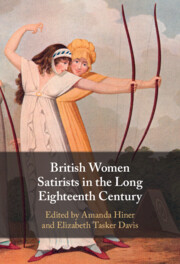Book contents
- British Women Satirists in the Long Eighteenth Century
- British Women Satirists in the Long Eighteenth Century
- Copyright page
- Dedication
- Contents
- Illustrations
- Notes on Contributors
- Acknowledgements
- Introduction
- Part I Traditions and Breaks
- Part II Publicity and Print Culture
- Chapter 6 Women’s Satires of the Literary Marketplace in Eighteenth-Century England
- Chapter 7 Charlotte Lennox, Satirical Poetry, and the Rise of Participatory Democracy
- Chapter 8 Jane Collier’s Satirical Fable
- Chapter 9 Hiding in Plain Sight
- Part III Moral Debates and Satiric Dialogue
- Appendix Selected List of Eighteenth-Century Women Writers and Their Satiric Works
- Selected Bibliography and Guide to Further Reading
- Index
Chapter 7 - Charlotte Lennox, Satirical Poetry, and the Rise of Participatory Democracy
from Part II - Publicity and Print Culture
Published online by Cambridge University Press: 31 March 2022
- British Women Satirists in the Long Eighteenth Century
- British Women Satirists in the Long Eighteenth Century
- Copyright page
- Dedication
- Contents
- Illustrations
- Notes on Contributors
- Acknowledgements
- Introduction
- Part I Traditions and Breaks
- Part II Publicity and Print Culture
- Chapter 6 Women’s Satires of the Literary Marketplace in Eighteenth-Century England
- Chapter 7 Charlotte Lennox, Satirical Poetry, and the Rise of Participatory Democracy
- Chapter 8 Jane Collier’s Satirical Fable
- Chapter 9 Hiding in Plain Sight
- Part III Moral Debates and Satiric Dialogue
- Appendix Selected List of Eighteenth-Century Women Writers and Their Satiric Works
- Selected Bibliography and Guide to Further Reading
- Index
Summary
This essay examines Charlotte Lennox’s satirical poetry in her collection of thirty poems in Poems on Several Occasions (1747). Many of these poems were republished between 1750 and 1785 in periodicals and miscellanies, such as The New Foundling Hospital of Wit, published in England and America. I argue that Lennox’s targets were frequently the social systems designed to restrict women’s influence to domestic settings. At a time when elements of participatory democracy were gaining global traction and when many political poems engaged with social unrest, Lennox wrote, “Satire, like a magnifying Glass, may aggravate every Defect, in order to make its Deformity appear more hideous.” Lennox’s amplifying attention to the dominant culture’s method of entrapping women and her advocacy for participatory democracy are informed by her exposure as a preteen with Scottish and Irish parents to a diverse range of national and racial backgrounds, including Mohawks, Hurons, Iroquois, Africans, Dutch, and French residents, in Albany and Schenectady, New York. She uses satiric poetry to cast an accusing light on unjust power structures and to promote democratic aims by alluding to the belief that the power of the government is vested in all those who are governed.
Keywords
- Type
- Chapter
- Information
- British Women Satirists in the Long Eighteenth Century , pp. 133 - 151Publisher: Cambridge University PressPrint publication year: 2022

